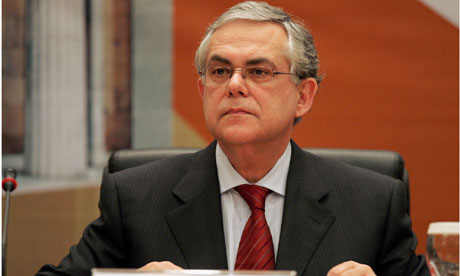Helena Smith in Athens guardian.co.uk, Monday 7 November 2011 19.35 GMT
The economist, ex-vice-president of the European Central Bank, is touted as the ideal candidate to replace George Papandreou
Lucas Papademos, who is tipped to become Greece's new prime minister, is seen as a safe pair of hands in Berlin and Paris. Photograph: Simela Pantzartzi/EPA
The renowned economist Lucas Papademos has emerged as the favoured candidate to head Greece's first coalition government in decades after the beleaguered George Papandreou announced he would step down to make way for a government of national unity.
Papademos, the former vice president of the European Central Bank, was in the US when it emerged on Sunday that political deadlock had been broken in Athens, with the country's warring political factions finally agreeing on the formation of an interim administration that would include figures from the socialist Pasok party and conservative opposition.
As Papandreou wrangled with Antonis Samaras, the New Democrat leader, over the makeup of the new cabinet, Papademos made the journey back home on a transatlantic flight, but he has yet to comment on whether he will become prime minister.
For a country not only burdened by debt but closer to default than ever before, his appointment at the helm of a transitional government in Athens would be widely welcomed. An avuncular figure, Papademos is well respected in the European Union. In the corridors of power in Paris and Berlin, the capitals that count in deciding Greece's fate, he is seen as a safe pair of hands, more capable than most at navigating the crisis-hit nation away from the shores of economic Armageddon.
EU officials say the 64-year-old technocrat fits the bill of being a "neutral" non-partisan personality who can stay out of the snake-pit that is the Greek political scene.
"He's pro-European, he knows Europe and the Europeans know him," said Paschos Mandravelis, a prominent political commentator in the country. "He would be the perfect choice."
Educated in the US, where he earned his first degree in physics at the Massachusetts Institute of Technology, Papademos is typical of Greek scholars who thrive abroad. After gaining a second degree in electrical engineering and a doctorate in economics, he went on to hold academic posts at Columbia University, Harvard University and the University of Athens. A specialist in macroeconomic theory and policy, he still teaches as a visiting professor in the US.
Returning to Athens in the mid-80s, after serving on the board of the Federal Reserve Bank of Boston, he became chief economist at the Bank of Greece.
In 1994, he was elevated to the post of governor, overseeing Greece's transition from the drachma, the world's oldest currency, to the euro a decade ago. In 2002, he joined the European Central Bank where he worked under the recently departed president Jean-Claude Trichet before crisis called, and once again, he returned to Athens to serve as an informal adviser to Papandreou.
Greece's new administration has its work cut out. Within six weeks, it must approve the controversial bailout programme agreed for the country by EU leaders last month; secure the latest tranche of emergency aid, an €8bn (£6.9bn) injection that is vital to staving off bankruptcy; oversee the passage through parliament of next year's budget and launch what are expected to be tortuous negotiations with private sector banks who have agreed, in principle, to write-off 50% of their Greek bond holdings as part of the rescue plan.
Those who know Papademos well say he will want to be guaranteed the freedom of time and manoeuvre. "He would be a good choice if he had the freedom to choose his team, decide on what policies to follow and is given 12 months at least in power," Stefanos Manos a former conservative finance minister said. "With a tenure of three months, no one will listen to him."
Manos said he did not think his "naturally cautious" friend would agree to accept the post without careful consideration.
"As things stand, the leaders of both political parties want to give him his cabinet, tell him what to do and let him go by the end of January. He won't be able to take any serious measures. It's a recipe for disaster," Manos said. "Lucas is a thoughtful person, an honest guy, a clever person but he's also very cautious ... he's going to want to lay down his terms and, as they stand, I very much doubt that he will accept. I don't think for a moment he is willing to be a puppet prime minister."
Lucas Papademos emerges as frontrunner to be new Greek PM | World news | The Guardian
![The [Greek] European Tragedy](https://blogger.googleusercontent.com/img/b/R29vZ2xl/AVvXsEiWKI5s90SFm1wWTk6bs4p7CgslaC2SnYPsrZhb-B-smOufNNCSxCvpBLI9hOB-LsXZjir_PNmEiMk2-E62F3xkg96IoC6QFAaZAnPRTVH340IN9WBRmWJqPkjWlgyRj3zpALp7h6hvA58/s920/GkBack_new.jpg)
